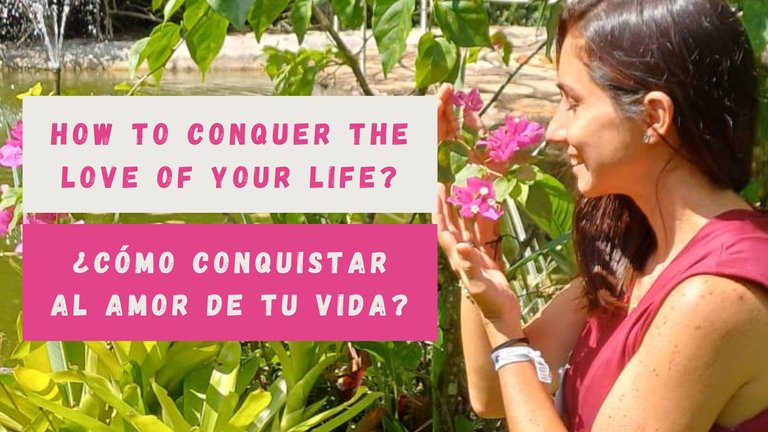
Para poder responder esta pregunta, primero debes saber ¿Quién es el amor de tu vida? Quizás si eres madre, el primer ser que llega a tu mente es tu hijo, si tienes pareja y todo marcha bien probablemente será él o ella, podrías pensar también en tu madre o tu padre, en fin, con suerte puede que tengas una larga lista de personas maravillosas a las que puedas llamar "amor", y si, cada una de ellas es un pilar fundamental en tu vida, un espejo maravilloso que te permite ver tus luces y sombras, y por ende te ayuda a evolucionar. Sin embargo, hoy vengo a plantearte otro candidato para ese puesto... Tu... Si, Tu.
¿No es a ti a quién deberías conquistar en primer lugar?, estoy segura de que sí estás leyendo estas líneas, ya estás listo para recordar que mereces estar en el top de tu lista de grandes amores. Y no, no es una invitación a la egolatría, es un recordatorio de que Tu eres el único ser al cuál has venido a cuidar, guiar, proteger y amar desde la primera inhalación que dió comienzo a tu vida hasta la última exhalación que te lleve a trascender.
Pensando en esto, hoy compartiré contigo algunos puntos de reflexión que espero te lleven a evaluar tu relación contigo y te permitan trabajar en amarte incondicionalmente para que desde ese lugar de plenitud tengas la oportunidad de dar un amor cada vez más puro a quienes te rodean... Aprende a tratarte a ti mismo con amor y verdadera compasión y te aseguro que como consecuencia tratarás mucho mejor a los otros, tus relaciones serán más sanas y amorosas, porque la práctica ya se habrá integrado en ti.
English Version
To answer this question, You need to know: Who is the love of your life? Perhaps if you are a mother, the first being that comes to mind is your child. If you have a partner and everything is going well, it will probably be the person you think about. You could also think of your mother or father. Well, luckily you can have a long list of wonderful people that you can call “love”. It is true that each of them is a fundamental pillar in your life and they become wonderful mirrors that allow you to see your lights and shadows. However, I come to propose another candidate for that position. You, yes, you.
It should not be like that? I am sure that if you are reading these lines it is because You are ready to remember that you deserve to be at the top of your list of great loves. And no, it is not an invitation to selfishness. It is a reminder that you are the only being you have come to care for, guide, protect and love from the first inhalation that began your life until the last exhalation that takes you to transcend.
Thinking about this, I will share with you some points of reflection that I hope will lead you to evaluate your relationship with yourself and allow you to work on loving yourself unconditionally. Because, from that place of self-esteem you will have the opportunity to give an increasingly pure love to those who love you. If you learn to treat yourself with love and truly compassion, I assure you the consequence will be that you treat others much better, your relationships will be healthier and more loving.

Siguiendo este orden de ideas, me gustaría comenzar por decirte que no hablaremos de lo obvio, porque a estas alturas ya sabes que parte importante de amarte a ti mismo es cuidarte, descansar, hacer ejercicio, respetarte, aceptar tu sentimientos, etc. Sino que atenderemos a aspectos mucho más sutiles, cosas simples y cotidianas, que resultan tan aparentemente sencillas que no tomamos en cuenta.
Comenzamos...
🫠 Actitud ante el error: Amar incondicionalmente tal como la palabra lo indica es un acto libre de condiciones, de exigencias de expectativas. Ahora bien, descubramos si te amas incondicionalmente, ¿Qué pasa cuando cometes un "error"? ¿Cómo te tratas cuando olvidas algo? ¿Qué haces o qué te dices en aquellos momentos en los que "fracasas"? Permite que estás preguntas resuenen en lo más profundo de tu ser para que puedas descubrir qué actitudes inconscientes estás llevando a cabo en estas situaciones, y tú me dirás ¿Qué tiene esto que ver? Tiene toooodo que ver, porque es muy fácil amar o amarse cuando las cosas van según el plan, cuando eres reluciente , admirado o "correcto" (según lo que eso significa para ti). Pero amar el error es otra historia, no es fácil amarte cuando no eres lo que esperas de ti mismo, cuando tus esfuerzos parecen no ser sufrientes, cuando no le agradas a otros... Sin embargo, es allí cuando más amor necesitas y la única persona que puede dártelo eres tú, por eso tratarte con compasión y aprender a perdonarte es fundamental para que crezca en ti un verdadero amor incondicional hacia ti mismo.
English Version
Following this order of ideas, I would like to start by telling you that we will not talk about obvious things, because by now you already know that self-esteem is taking care of yourself, resting, exercising, respecting yourself, accepting yourself, your feelings, etc. But we will attend to much more subtle aspects, simple and everyday things, which are so apparently simple that we do not take them into account.
We start...
🫠 Attitude toward error: Loving unconditionally, as the word indicates, is an act free of conditions and expectations. Now, let's find out if you love yourself unconditionally: What happens when you make a “mistake”? How do you behave with yourself when you forget something? What do you do, or what do you tell yourself in moments that you "fail"? Let these questions resonate in the depths of your being so that you can discover what unconscious attitudes you are carrying out in these situations. Maybe you are thinking, What does this have to do with self-love? It has everything to do with that, because it's so easy to love when things are going according to plan, when you're brilliant, admired, or "right" (depending on what that means to you). But loving error is another story. It is not easy to love yourself when you are not what you expect, when your efforts do not seem to be enough, when others do not like you. However, is in those kind of moments when you need more love and the only person who can give it to you is you, so treating yourself with compassion and learning to forgive yourself is essential for true unconditional love for yourself to grow in you.

🏆 Actitud ante el logro: Sólo tú sabes todo lo que has vivido, cada historia, cada herida, nadie más que tú sabe el esfuerzo que has puesto para lograr eso que quizás a otro le parece insignificante. Entonces, ¿no deberías ser tú el primero en reconocer y celebrar tus logros? Con esto en mente, pregúntate ¿Te permites valorar tus avances? ¿Te sientes en libertad de celebrar tus logros sin culpa o falsa humildad? ¿Puedes reconocer tus dones y talentos?. El efecto de autorreforzarse (celebrarte, premiarte, etc) tiene un gran impacto en tu autoestima, pues no solo te motiva a seguir logrando avances y te hace sentir bien contigo mismo, sino que también te libera de la necesidad de reconocimientos externo que tanto dolor causa cuando no se consigue. Tener la capacidad de darte el reconocimiento que necesitas, poner tu valor y autoestima nuevamente en tus manos.
En síntesis para conquistar al amor de tu vida, es importante":
- Reconocer que haces lo mejor que puedes con lo que tienes (es decir, con tus memorias, heridas, temores e inseguridades).
- Tener presente que nadie mas que tu puede comprenderte 100%, pues sólo tu conoces a plenitud tu historia, tus vivencias, heridas y potenciales.
- Amar cada paso que has dado, valorar los avances y aprendizajes que has alcanzado.
Después de mirarte y evaluar tu historia,
¿Cómo podrías no amarte y tenerte compasión si sabes lo que has pasado, cuánto lo has intentado, lo que te has esforzado?..
Finalmente, quiero recordarte que tú valor no está determinado por tus resultados. Vales por ser quién eres, no por lo que tengas, logres o por lo que otros opinen de ti.
English Version
🏆 Attitude towards achievement: Only you know everything you have experienced, every story, every wound. No one but you knows the effort you have put in to achieve what may seem insignificant to another. So shouldn't you be the first to recognize and celebrate your achievements? With this in mind, ask yourself, do you allow yourself to evaluate your progress? Do you feel free to celebrate your achievements without guilt or false humility? Can you recognize your gifts and talents? The self-reinforcing effect (celebrating yourself, rewarding yourself, etc.) has a great impact on your self-esteem, since it not only motivates you to continue progressing and makes you feel good about yourself, but it also frees you from the need for external recognition that causes so much pain when you are not achieved. Having the ability to give yourself the recognition you need puts your value and self-esteem back in your hands.
In short, to win over the love of your life, it is important:
- Recognize that you do the best you can with what you have (that is, with your memories, wounds, fears and insecurities).
- Keep in mind that no one but you can understand you 100% because only you fully know your story, your experiences, wounds and potential.
- Love every step you have taken, value the progress and learning you have achieved.
After looking at you and evaluating your history, How can you not love yourself and have compassion for yourself if you know what you've been through, how hard you've tried, how hard you've worked?
Finally, I want to remind you that your value is not determined by your results. You are valuable for being who you are, not for what you have, achieve or what others think of you.
Me reservo todos los derechos de mi publicación. Los textos e imágenes son de mi propiedad / Banner realizado en canva

Cierto. Una vez escuché a alguien que dijo que para poder dar amor hay que sentir mucho amor hacia uno mismo. Aquellas palabras se quedaron fijas como convreto en la construcción de reflexiones.
Y luego me llegó la excepción, que es la de amar a Dios por sobre todas las cosas.
Esa frase es maravillosa y cuando la integramos (resuena en nosotros) todo cambia. Yo he aprendido que icluso amar a Dios parte de amarse uno mismo, porque al hacerlo honramos su sabiduría, amor y perfección 💖
Me gustó el colofón del texto, no son los resultados los que nos definen, pienso que nos define nuestro camino: honestidad (también con nosotros), aceptar el error, rectificar y continuar. Saludos
Gracias por leerme y comentar... Coincido contigo, lo más valioso es que tenemos la capacidad de evolucionar, aprender de los "errores" y volvernos cada día nuestra mejor versión. Un abrazo
Lo que llamamos "amor propio" muchas veces sin comprender el auténtico significado.
Así es, llego el momento de comprenderlo y de integrarlo 💖💖💖